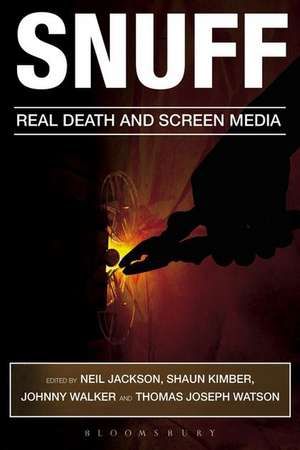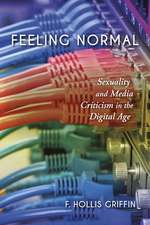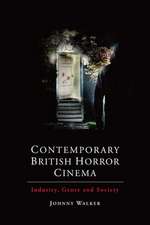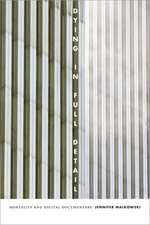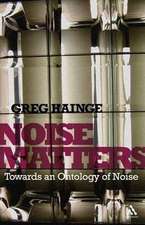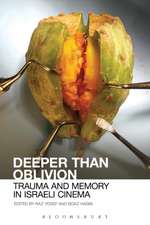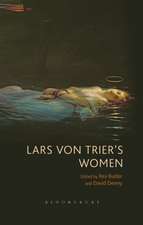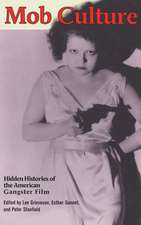Snuff: Real Death and Screen Media
Editat de Dr Neil Jackson, Shaun Kimber, Johnny Walker, Thomas Joseph Watsonen Limba Engleză Paperback – 9 mar 2016
| Toate formatele și edițiile | Preț | Express |
|---|---|---|
| Paperback (1) | 240.50 lei 6-8 săpt. | |
| Bloomsbury Publishing – 9 mar 2016 | 240.50 lei 6-8 săpt. | |
| Hardback (1) | 834.12 lei 6-8 săpt. | |
| Bloomsbury Publishing – 9 mar 2016 | 834.12 lei 6-8 săpt. |
Preț: 240.50 lei
Preț vechi: 274.97 lei
-13% Nou
Puncte Express: 361
Preț estimativ în valută:
46.02€ • 48.17$ • 38.30£
46.02€ • 48.17$ • 38.30£
Carte tipărită la comandă
Livrare economică 31 martie-14 aprilie
Preluare comenzi: 021 569.72.76
Specificații
ISBN-13: 9781628921120
ISBN-10: 1628921129
Pagini: 344
Ilustrații: 65 bw illus
Dimensiuni: 152 x 229 x 28 mm
Greutate: 0.5 kg
Editura: Bloomsbury Publishing
Colecția Bloomsbury Academic
Locul publicării:New York, United States
ISBN-10: 1628921129
Pagini: 344
Ilustrații: 65 bw illus
Dimensiuni: 152 x 229 x 28 mm
Greutate: 0.5 kg
Editura: Bloomsbury Publishing
Colecția Bloomsbury Academic
Locul publicării:New York, United States
Caracteristici
The
first
scholarly
collection
to
seriously
address
the
phenomenon
of
snuff
from
the
term's
conception
in
the
1970s
to
the
present
day
Notă biografică
Neil
Jacksonteaches
Film
at
the
University
of
Lincoln,
UK,
and
has
published
on
popular
cinema
in
various
books
and
journals.
He
is
currently
preparing
a
critical
study
of
Hollywood's
representation
of
the
adult
film
industry.Shaun
Kimberis
Senior
Lecturer
in
Media
Theory
at
Bournemouth
University,
UK.
He
is
the
author
ofControversies:
Henry:
Portrait
of
a
Serial
Killer(2011)
and
is
currently
working
on
the
co-authored
bookWriting
&
Selling
Horror
Screenplays.Johnny
Walkeris
Lecturer
in
Media
at
Northumbria
University,
UK.
He
is
the
author
ofContemporary
British
Horror
Cinema:
Industry,
Genre
and
Society(2015)
and
founding
co-editor
of
the
Global
Exploitation
Cinemas
book
series
(Bloomsbury).Thomas
Joseph
Watsonlectures
in
Media
Studies
at
Teesside
University,
UK.
His
research
investigates
the
role
of
film
form
in
the
depiction
of
violence
in
contemporary
audio-visual
media.
He
has
published
on
pornography,
documentary
film,
and
experimental
video-art.
Cuprins
List
of
FiguresForeword:
A
Culture
of
CHangeDavid
Kerekes
(Owner
of
Headpress
and
author
of
Killing
For
Culture)Acknowledgements
Introduction:
Shot,
Cut
and
SlaughteredNeil
Jackson
(University
of
Lincoln,
UK)Part
I
-
The
Changing
Meaning
of
"Snuff"Chapter
1:
The
Way
to
Digital
DeathJulian
Petley
(Brunel
University,
UK)Chapter
2:
The
Affective
Reality
of
SnuffMisha
Kavka
(University
of
Auckland,
New
Zealand)Chapter
3:
Animal
SnuffSimon
Hobbs
(University
of
Portsmouth,
UK)Chapter
4:
Breathing
New
Life
into
Old
Fears:
Extreme
Pornogrpahy
and
the
Wider
Politics
of
SnuffClarissa
Smith
(University
of
Sunderland,
UK)Chapter
5:
From
Snuff
to
the
South:
The
Global
Reception
of
Cannibal
HolocaustNicolo
Gallio
(University
of
Bologna,
Italy)
and
Xavier
Mendik
(University
of
Brighton,
UK)Chapter
6:
A
Murder
Mystery
in
Black
and
Blue:
The
Marketing,
Distribution
and
Cult
Mythology
of
Snuff
in
the
UKMark
McKenna
(University
of
Sunderland,
UK)Chapter
7:
Traces
of
Snuff:
Black
Markets,
Fan
Subcultures
and
Underground
Horror
in
the
90sJohnny
Walker
(Northumbria
University,
UK)Chapter
8:
SNuff
2.0:
Real
Death
Goes
HD
ReadyMark
Astley
(Independent
Scholar,
UK)Part
II
-
"Snuff"
Across
Film
and
TelevisionChapter
9:
Unfound
Footage
and
Unfounded
Rumours:
The
Manson
Family
Murders
and
the
Persistence
of
SnuffMark
Jones
&
Gerry
Carlin
(University
of
Wolverhampton,
UK)Chapter
10:
Wild
Eyes,
Dead
Ladies:
The
Snuff
Filmmaker
in
Realist
HorrorNeil
Jackson
(University
of
Lincoln,
UK)Chapter
11:
The
Mediation
of
Death
in
Fictional
Snuff:
Reflexivity,
Viewer
Interpellation
and
Ethical
ImplicationXavier
Aldana
Reyes
(Manchester
Metropolitan
University,
UK)Chatper
12:
"Why
Would
you
Film
It?"
Snuff,
Sinister
and
Contemporary
US
Horror
CinemaShaun
Kimber
(Bournemouth
University,
UK)
Chapter
13:
Cinema
as
Snuff:
From
Pre-Cinema
to
Shadow
of
the
VampireLinda
Badley
(Middle
Tennessee
State
University,
USA)Chapter
14:
AffectTina
Kendall
(Anglia
Ruskin
University,
UK)Chapter
15:
A
View
to
Kill:
Perspectives
on
Faux-Snuff
and
SelfSteve
Jones
(Northumbria
University,
UK)Select
BibliographyContributors
Recenzii
There
is
much
to
be
said
for
this
timely
collection
of
essays
...
It
provides
a
rich
archive
of
sources
for
interested
readers;
it
is
diverse
in
range
but
coherent
in
remit,
and
it
addresses
the
topic
broadly
enough
to
appeal
to
many
different
scholars
...
[This]
is
a
serious
intervention
deliberately
situated
at
the
intersection
of
debates
about
violence
in
society
and
violence
in
representation,
which
has
long
been
a
somewhat
sensationalized
space;
it
is
an
original
and
stimulating
contribution
to
an
otherwise
undersubscribed
area
of
intellectual
interest.
This
book
will
be
valuable
to
anyone
interested
in
the
ongoing
debate
about
visuality,
violence
and
death.
These essays meticulously examine the history and mythology of the visual media's 'unholy grail'-the spectral 'real' behind film's reality effects. Tracing snuff's evolution from pornography to propaganda, from cult phenomenon to mainstream culture, this is the most comprehensive effort to date to track down the elusive phenomenon hovering at (and often defining) the boundaries between life and death, voyeurism and violence, terror and titillation, art and exploitation, realism and reality. Anyone seeking an unflinching glimpse of media in the digital age cannot ignore this collection. What was unthinkable a decade ago is now routine. Never have violence and terror been at once so visible and, as a result, so banal.
In the 1970s a toxic brew of urban decay, rising crime rates and the 'porno plague' gave rise to a new myth: that of the snuff film. Although the combination of sex and murder in the featureSnuff(1976) was quickly revealed as a hoax and the FBI could find no evidence that the real thing existed, the concept of the snuff film has endured and, ironically, taken on a life of its own. This collection of fascinating essays advances a scholarly and rigorous consideration of how the fringes of popular culture have become mainstreamed, and how media myths can become disturbing realities.
Snuff: Real Death and Screen Mediais both thorough and wide-ranging in its approaches to the complex and malleable category of the snuff film. This book is destined to become the key text on the representations and public debates which underpin the charged and vital topic of real death on screen, and the cultural, commercial, legal, and affective consequences of its associated myths.
These essays meticulously examine the history and mythology of the visual media's 'unholy grail'-the spectral 'real' behind film's reality effects. Tracing snuff's evolution from pornography to propaganda, from cult phenomenon to mainstream culture, this is the most comprehensive effort to date to track down the elusive phenomenon hovering at (and often defining) the boundaries between life and death, voyeurism and violence, terror and titillation, art and exploitation, realism and reality. Anyone seeking an unflinching glimpse of media in the digital age cannot ignore this collection. What was unthinkable a decade ago is now routine. Never have violence and terror been at once so visible and, as a result, so banal.
In the 1970s a toxic brew of urban decay, rising crime rates and the 'porno plague' gave rise to a new myth: that of the snuff film. Although the combination of sex and murder in the featureSnuff(1976) was quickly revealed as a hoax and the FBI could find no evidence that the real thing existed, the concept of the snuff film has endured and, ironically, taken on a life of its own. This collection of fascinating essays advances a scholarly and rigorous consideration of how the fringes of popular culture have become mainstreamed, and how media myths can become disturbing realities.
Snuff: Real Death and Screen Mediais both thorough and wide-ranging in its approaches to the complex and malleable category of the snuff film. This book is destined to become the key text on the representations and public debates which underpin the charged and vital topic of real death on screen, and the cultural, commercial, legal, and affective consequences of its associated myths.
